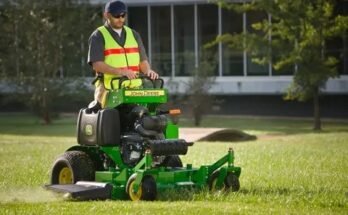Farm Jobs in the USA
The agricultural sector plays a vital role in the United States economy, employing millions of individuals across various farm jobs. From crop cultivation to livestock management, farm jobs offer diverse opportunities for individuals interested in contributing to food production and sustainability. This article explores the landscape of farm jobs in the USA, detailing the types of positions available, necessary skills, career prospects, and the benefits and challenges associated with working in agriculture.
1. The Importance of Agriculture in the USA
Agriculture is a cornerstone of the American economy, contributing approximately $1 trillion to the GDP and employing around 2% of the nation’s workforce. The U.S. is one of the largest agricultural producers globally, known for its vast landscapes and a diverse range of crops and livestock. The sector encompasses everything from large industrial farms to small family-run operations, each playing a unique role in food production and rural economies.
1.1 Key Agricultural Sectors
The agricultural industry in the USA can be divided into several key sectors, each offering different types of farm jobs:
- Crop Production: This sector focuses on the cultivation of various crops, including grains, fruits, vegetables, and nuts. It encompasses both traditional farming practices and innovative agricultural techniques.
- Livestock Farming: This involves raising animals for meat, dairy, and other products. Common livestock includes cattle, pigs, sheep, and poultry.
- Dairy Farming: A subset of livestock farming, dairy farming focuses specifically on the production of milk and other dairy products.
- Horticulture: This sector involves the cultivation of plants, flowers, and landscaping. Horticulturists may work in greenhouses, nurseries, or garden centers.
- Aquaculture: The farming of fish, shellfish, and other aquatic organisms is a growing sector within agriculture, providing a vital source of protein for consumers.
2. Types of Farm Jobs Available
Farm jobs encompass a wide range of positions, catering to various skills and experience levels. Here are some common types of farm jobs available in the USA:
2.1 Entry-Level Positions
Entry-level positions on farms often require minimal experience and can serve as a stepping stone into the agricultural sector. Common entry-level roles include:
- Farm Laborer: Responsible for general farm tasks such as planting, harvesting, and maintaining crops or livestock. Laborers may also assist with equipment operation and maintenance.
- Harvest Worker: Specifically focused on harvesting crops, this position may involve hand-picking fruits and vegetables or operating machinery to collect grains.
- Greenhouse Technician: Works in a controlled environment, helping to grow and maintain plants, flowers, or vegetables in greenhouses.
2.2 Skilled Positions
Skilled positions require specialized training or experience and often come with higher responsibilities. Common skilled positions include:
- Farm Equipment Operator: Operates and maintains heavy machinery used in planting, cultivating, and harvesting crops. This role requires knowledge of machinery and safety protocols.
- Livestock Handler: Responsible for caring for animals, including feeding, cleaning, and monitoring their health. Livestock handlers may work with cattle, pigs, sheep, or poultry.
- Irrigation Specialist: Focuses on managing irrigation systems to ensure that crops receive adequate water. This role often requires knowledge of agricultural practices and irrigation technology.
2.3 Management Positions
As individuals gain experience in agriculture, they may progress to management roles that involve overseeing operations and decision-making. Common management positions include:
- Farm Manager: Responsible for the overall operation of a farm, including planning, budgeting, staffing, and ensuring compliance with regulations. Farm managers play a crucial role in driving productivity and profitability.
- Crop Consultant: Provides expert advice on crop management, pest control, and soil health. Consultants work closely with farmers to optimize yields and sustainable practices.
- Agricultural Sales Representative: Works for companies that sell agricultural products, such as seeds, fertilizers, and equipment. Sales representatives provide customer service and technical support to farmers.
3. Skills and Qualifications for Farm Jobs
While specific requirements may vary by position, certain skills and qualifications are generally essential for success in farm jobs:
3.1 Education and Training
- High School Diploma or GED: Many entry-level farm jobs require a high school diploma or equivalent. This educational background provides foundational skills necessary for various roles.
- Vocational Training: Some skilled positions may require vocational training or certifications in specific agricultural practices, machinery operation, or safety protocols.
- Bachelor’s Degree: For management or specialized positions, a degree in agriculture, horticulture, or a related field may be preferred.
3.2 Essential Skills
- Physical Stamina: Farm jobs often involve physically demanding tasks, such as lifting heavy objects, standing for long periods, and working outdoors in various weather conditions.
- Technical Skills: Familiarity with farm machinery, irrigation systems, and agricultural technology is essential for many positions. Workers should be comfortable using and maintaining equipment.
- Problem-Solving Abilities: Farmers and agricultural workers frequently encounter challenges, such as pest infestations or equipment breakdowns. Strong problem-solving skills are necessary for finding effective solutions.
- Attention to Detail: Precision is crucial in farming, as small errors can lead to significant losses. Attention to detail helps ensure that tasks are completed correctly and efficiently.
- Teamwork: Many farm operations involve collaboration among workers. The ability to work effectively in a team is essential for achieving farm goals.
4. Career Opportunities and Advancement
The agricultural sector offers numerous opportunities for career advancement. Here are some potential career paths for individuals in this field:
4.1 Entry-Level Positions
Many individuals start their careers in entry-level positions, such as farm laborers or harvest workers. These roles provide valuable experience and exposure to different aspects of farm operations.
4.2 Skilled Positions
After gaining experience, individuals can pursue skilled positions, such as equipment operators or livestock handlers. Specializing in a specific area of farming can lead to higher pay and greater job security.
4.3 Management Roles
With experience and training, workers can move into management positions, overseeing teams and managing farm operations. Farm managers play a critical role in ensuring productivity and profitability.
4.4 Specialized Roles
Experienced agricultural professionals may transition into specialized roles, such as agronomists, crop consultants, or agricultural scientists. These positions often require advanced degrees and expertise in specific areas of agriculture.
4.5 Entrepreneurship
Some agricultural professionals choose to start their own farms or agribusinesses. Entrepreneurship in agriculture requires a strong understanding of business management, marketing, and finance.
5. Benefits of Working in Agriculture
Working in farm jobs offers several benefits that make it an appealing career choice:
5.1 Job Stability
The agricultural sector provides a level of job stability, as there is a constant demand for food production. Even during economic downturns, farm jobs often remain in demand.
5.2 Competitive Pay
Many farm jobs offer competitive salaries, especially for skilled positions and management roles. Pay can vary based on location, experience, and specialization.
5.3 Opportunities for Skill Development
The agriculture industry provides ample opportunities for workers to develop new skills and advance their careers. Many farms offer training programs and mentorship to help employees gain expertise.
5.4 Connection to Nature
For those who enjoy the outdoors, working on a farm provides a unique opportunity to connect with nature and contribute to sustainable food production.
5.5 Community Impact
Farm workers play a crucial role in feeding communities and supporting local economies. Many individuals find fulfillment in contributing to food security and sustainable agricultural practices.
6. Challenges of Working in Agriculture
Despite the benefits, there are also challenges to consider when pursuing a career in agriculture:
6.1 Seasonal Employment
Many farm jobs are seasonal, with peak periods during planting and harvesting times. Workers may face periods of unemployment during the off-season.
6.2 Physical Demands
While many enjoy the physical nature of farm work, it can also lead to fatigue and strain. Workers must prioritize self-care and proper lifting techniques to prevent injuries.
6.3 Weather Dependence
Agricultural operations are highly dependent on weather conditions, which can impact productivity and yields. Droughts, floods, or other extreme weather events can pose significant challenges.
6.4 Economic Fluctuations
The agricultural industry can be affected by economic cycles, leading to fluctuations in job availability and farm profitability. Changes in commodity prices can impact farm operations and employment.
6.5 Safety Risks
Working on farms can pose safety risks, including exposure to hazardous materials, machinery accidents, and zoonotic diseases. Adhering to safety protocols is crucial for preventing accidents and injuries.
7. How to Find Farm Jobs in the USA
If you’re interested in pursuing a career in agriculture, here are some effective strategies for finding job opportunities:
7.1 Job Boards and Websites
Online job boards such as Indeed, Glassdoor, and CareerBuilder regularly list agricultural job openings across the country. These platforms allow you to filter positions based on location, job type, and experience level.
7.2 Company Websites
Many farms and agricultural companies post job openings directly on their websites. Research local farms or larger agricultural operations to find available positions.
7.3 Agricultural Organizations
Consider reaching out to agricultural organizations or associations in your area. Many organizations provide job boards, networking opportunities, and resources for individuals interested in agriculture.
7.4 Local Employment Agencies
Local employment agencies specializing in agriculture can assist in finding job opportunities and provide valuable advice on navigating the application process.
7.5 Networking
Leverage your network to learn about job openings. Connect with friends, family, or acquaintances in the agricultural industry, as they may have insights or recommendations for available positions.
8. Preparing for a Career in Agriculture
If you’re ready to pursue a career in agriculture, here are some steps to help you prepare:
8.1 Research Requirements
Before applying for positions, research the qualifications and skills needed for the specific roles you are interested in. This information will help you tailor your applications effectively.
8.2 Gain Experience
Consider internships or part-time positions on farms or agricultural organizations to gain valuable experience and insights into farming operations.
8.3 Develop Relevant Skills
Focus on developing essential skills for the agricultural industry, such as technical skills, problem-solving abilities, and safety awareness. Participating in workshops or training programs can also be beneficial.
8.4 Build a Strong Resume
Tailor your resume to highlight your skills and experiences relevant to farm jobs. Be sure to include any relevant training, certifications, and previous job experiences.
8.5 Prepare for Interviews
Practice common interview questions and scenarios you might encounter in the agricultural field. Employers often look for candidates who can demonstrate a strong work ethic and a willingness to learn.
Farm Jobs in the USA
Farm jobs in the USA offer a wide range of opportunities for individuals seeking a fulfilling career in agriculture. With various positions available across different sectors, employees can find roles that align with their skills and interests. While the industry presents challenges, such as seasonal employment and economic fluctuations, the benefits—such as job stability, competitive pay, and opportunities for skill development—make agriculture an attractive career choice. By preparing effectively and actively seeking opportunities, you can build a successful career in the diverse and dynamic field of agriculture. Whether you’re interested in crop production, livestock management, or agribusiness, the possibilities in farm jobs are vast and promising.



